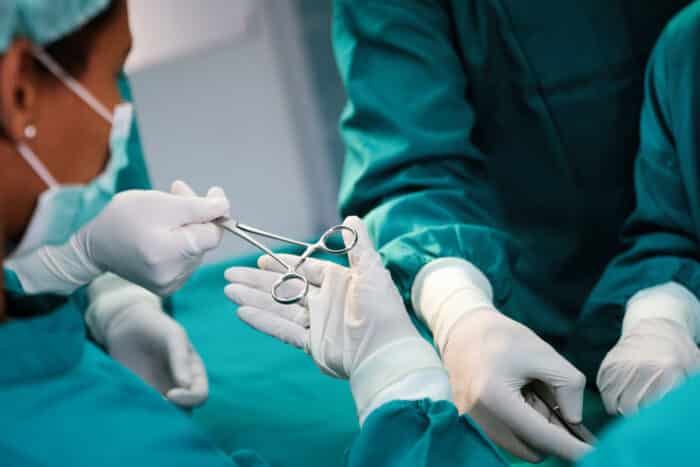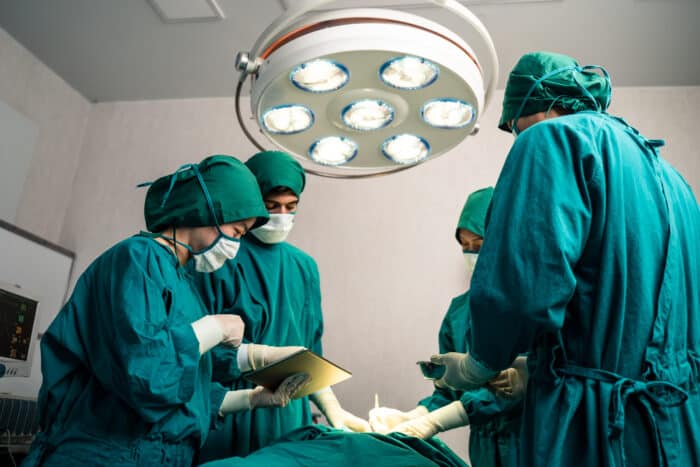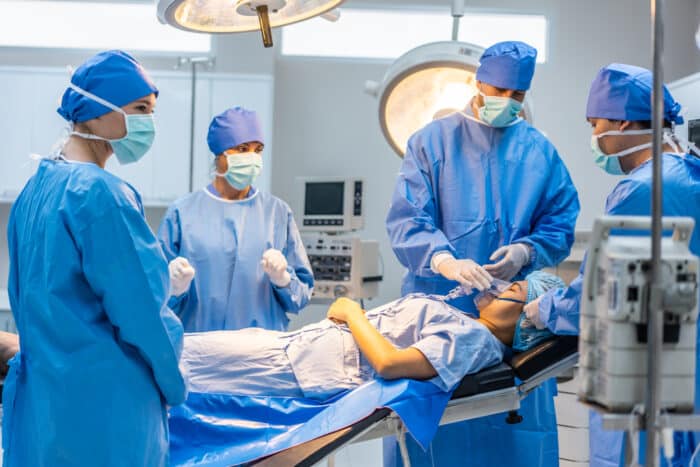So now you have acquired a formal education, got some clinical experience eventually getting certified, and are ready to seek out employment opportunities.
Then when you start to apply to the open positions, you will come across job descriptions describing about the role, requirements, skills, and earning prospects.
In this article, we will walk you through all these aspects of a Surgical Tech, how to become one, skills, duties, education, certification, requirements, salary potential, some JD Examples; and much more.
So, let’s start –
What is a Surgical Tech?
A Surgical Technologist, commonly known as a Surgical Tech, is a healthcare professional who plays a crucial role in the operating room. They are responsible for ensuring that surgical procedures run smoothly and safely.
They collaborate with surgeons, nurses, anesthesiologists, and other healthcare professionals, and they ensure all instruments are sterilized and ready for the next procedure.
They work in a dynamic, high-pressure environment to contribute to the success of surgical procedures, making healthcare safer and more efficient.
More On -> What is a Surgical Tech?
How to Become a Surgical Tech?
To become a Certified Surgical Technologist (CST), you’ll need to follow these steps –
- Enroll in a Surgical Tech Program
- Earn University Certificate
- Acquire Clinical Experience Through an Externship
- Apply and Pass the Certification exam. There are 3 options – NBSTSA, NCST, or NCCT. We recommend NCST by AAH
- Maintain Certification
Detailed Post -> How to Become a Surgical Tech?
Education
Just like any other career, to become a CST education is of most importance. You need to enroll in a Surgical Tech program, and then undergo clinical experience to get hands-on experience.
For education, you have 3 options – Associate Degree, Certificate Program, and Online Surgical Tech Program. But, considering all the aspects, pros, and cons, we recommend to you the accredited online Surgical Tech programs.
Certification
Certification is a way to demonstrate your competence as a surgical technologist, which can enhance your career opportunities in the healthcare industry.
There are mainly 3 certification options for you to opt for. They are as follows –
- National Board of Surgical Technology and Surgical Assisting (NBSTSA)
- National Center for Competency Testing (NCCT)
- Nationally Certified Surgical Technologist (NCST) through AAH
Once you pass the CST exam, you’ll be a certified surgical technologist. To maintain your certification, you’ll need to participate in continuing education to stay up-to-date in the field.
More On -> Surgical Tech Certification
Duties
As a Surgical Tech, you will assist the surgical team during surgeries, prepare the OR, sterilize equipment, and pass instruments to the surgical team.
Besides that, some of their main duties include –
- Preparing the Operating Room and making sure it’s sterile and equipped with all the necessary instruments, equipment, and supplies.
- Assisting During Surgery alongside the surgical team, passing instruments to the surgeon, holding tissues, and maintaining a sterile field.
- Anticipating the surgeon’s needs, ensuring instruments are readily available, and assisting with any unexpected situations.
- Ensuring Sterility throughout the procedure, ensuring infection control protocols are followed to prevent any contamination.
- Assisting in patient care by positioning, prepping, and ensuring the patient’s comfort during surgery.
- Helping transfer the patient, post-surgery to the recovery area and participating in the process of cleaning and restocking the operating room.
More On -> Surgical Tech Duties
Skills
Surgical technologists require a range of skills to excel in their roles. These skills are vital for surgical technologists to excel in their roles and contribute to successful surgeries and patient well-being.
Here are some essential skills for surgical techs –
- Attention to Detail
- Problem-Solving
- Dexterity
- Physical Stamina
- Organizational Skills
- Medical Terminology
- Empathy and Compassion
- Critical Thinking
- Surgical techs maintain high standards of professionalism and ethics in healthcare.
- They remain composed in high-stress situations during surgeries.
Read More:
-> Online Surgical Tech Programs
-> Surgical Tech Classes & Courses
-> Surgical Tech Program & Training
Salary
The annual average salary of Surgical Tech is $55,960, according to the BLS 2022 data. This converts to an hourly rate of around $28. The employment forecast for surgical assistants and technologists is also projected to grow by 5% in this decade.
Read -> Surgical Tech Salary
Surgical Tech Requirements
To become a Surgical Tech, you typically need to meet certain educational and certification requirements. Requirements for a surgical tech position typically include –
- High School Diploma.
- Certificate of Completion of an accredited Surgical Tech program.
- Proficiency in surgical instrumentation.
- Current certification in Basic Cardiac Life Support (BCLS).
- A solid grasp of surgical technology and procedures.
- Familiarity with medical terminology.
- A strong commitment to providing exceptional patient care.
More On -> Surgical Tech Requirements
Surgical Tech JD with Examples
A Surgical Tech plays a vital role in the operating room, assisting surgeons and nurses to ensure surgeries run smoothly. While seeking employment you need to apply to the open positions where you will come across job descriptions describing about the role.
Here are a few examples of the JD –
Example 1
We are currently seeking a qualified surgical technologist to provide vital support during our medical procedures. Your primary duties will involve the meticulous preparation and sterilization of operating rooms, essential equipment, and surgical instruments before each surgery.
Additionally, you will play a crucial role in preparing patients for their procedures and ensuring their overall satisfaction. To excel in this position, you should possess a solid grasp of surgical technology and procedures, with a preference for prior experience with surgical instrumentation.
Also Read:
Example 2
We are seeking an individual responsible for delivering high-quality care to perioperative patients. Your role involves ensuring a safe environment for patients, staff, and visitors, including the proper functioning of equipment and the availability of necessary supplies and medications.
You’ll also play a crucial part in assisting physicians by providing them with pertinent information. Additionally, your duties encompass maintaining the patient treatment area, organizing an efficient surgical schedule, and coordinating the surgical team for both emergent and scheduled procedures.
You May Also Like:
-> How to Become a Certified Surgical Tech?
-> Can You Be a Surgical Tech Without Certification?
Here’s what a JD Template looks like –
FAQs
What is the Difference between a Certified Surgical Tech and a Surgical Tech?
The primary difference between a Certified Surgical Tech (CST) and a Surgical Tech (ST) is that a CST has earned a professional certification, indicating that they have met specific educational and competency requirements in the field of surgical technology.
Here are the key distinctions –
Certification
A CST has successfully passed the National Board of Surgical Technology and Surgical Assisting (NBSTSA) national certification exam. This certification validates their knowledge and competence in surgical technology.
A Surgical Tech may not hold the same certification, which means they may have varying levels of education, training, or experience.
Educational Background
CSTs typically complete accredited surgical technology programs, which often include formal education, clinical training, and hands-on experience.
Surgical Techs may have diverse educational backgrounds, and some may learn on the job without formal education.
Knowledge and Skills
CSTs are expected to possess a comprehensive understanding of surgical procedures, sterile techniques, patient care, and instrumentation. They must adhere to strict standards and guidelines.
Surgical Techs, while skilled, may not have the same standardized level of knowledge and skills.
What is the Difference between Surgical Tech 1 and 2?
The distinction between “surgical tech 1” and “surgical tech 2” may not have a universal meaning, as the specific job titles and levels can vary between different healthcare facilities or regions.
It’s essential to note that, many hospitals and surgical departments use the more standardized certification of “Certified Surgical Technologist” (CST), which signifies a nationally recognized level of competence and expertise in surgical technology. Certification and experience often matter more.
However, here’s a general explanation of what these levels might indicate –
Surgical Tech I
This designation typically refers to an entry-level surgical technologist. Individuals with this title may be in the early stages of their surgical technology career or have just completed their formal education and certification.
They might be responsible for basic tasks in the operating room, such as preparing equipment, maintaining cleanliness, and assisting surgeons and nurses as needed. Their duties often require supervision and guidance.
Surgical Tech II
This level suggests a more experienced and potentially certified surgical technologist. Surgical Tech IIs typically have a few years of experience in the field and may have advanced skills and responsibilities.
They might handle more complex tasks during surgical procedures, provide training to Surgical techs, and demonstrate a higher level of independence. In some cases, Surgical Tech IIs may have specialized in a particular surgical area or procedure.
Is Surgical Tech Stressful?
Being a Surgical Tech can be stressful due to the fast-paced environment. However, the collaborative nature of the work eases the pressure, but intense moments happen during medical emergencies. Also, some individuals find surgeries and emergencies emotionally challenging, affecting their well-being.
Despite the stress, it’s rewarding, as you aid patients and ensure surgery success. The physicality is similar to many healthcare roles, often involving 40-hour workweeks. Schedules may include nights, weekends, and holidays, with standing and patient lifting. Hours vary by job and setting.
So overall, the job of a Surgical Tech can get stressful at times. But with self-care, like nutrition, rest, exercise, and leisure, you can maintain your mental and physical health. And with the skills like composure and attention to detail, you can carry out your role effectively.
Related:
-> CVOR Tech
-> Scrub Nurse vs Surgical Tech
-> Surgical Tech vs Surgical Assistant
-> Pros And Cons Of Being A Surgical Tech
Related Articles
-
How to Be Successful in College in 2022 – 7 Simple Tips to Succeed
-
How Do Scholarships Work? Read This First…Truth is Shocking
-
7 Best College Majors 2024: What Should I Major In?
-
How to Choose a College – 10 Things You Must Consider in 2024
-
Why Go to College? Top 13 Benefits for Adult Students in 2022
-
Top 5 Best Alternatives to Community College for 2024










